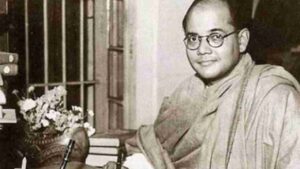Netaji Subhas Chandra Bose – A Saga of Courage and Leadership
Netaji Subhas Chandra Bose : Netaji Subhas Chandra Bose Jayanti stands as a poignant reminder of one of India’s most valiant freedom fighters. This year, as we celebrate the 127th Birth Anniversary of Netaji in 2024, it’s essential to delve into the life of this remarkable leader whose courage and leadership laid the foundation for the modern Indian state.

Early Life and Education of Netaji Subhas Chandra Bose
Netaji was born on January 23, 1897, in Cuttack, Odisha, as the ninth child of Janakinath Bose and Prabhavati Devi. His academic brilliance shone through as he completed his BA in Philosophy from Presidency College, Calcutta (now Kolkata). His journey took a pivotal turn when he traveled to England to undertake the Civil Services Examination, achieving notable success by scoring the highest marks in English and securing the fourth position overall.
Rebel Against the British Rule
In 1921, Netaji Subhas Chandra Bose resigned from the Indian Civil Service, marking the beginning of his rebellion against British rule. His frequent clashes with the authorities earned him the reputation of a rebel, challenging the status quo and setting the stage for his impactful role in India’s struggle for independence.
Political Journey of Netaji Subhas Chandra Bose
Netaji’s political journey was marked by mentorship under Chittaranjan Das, a prominent Congress leader. The formation of the Swaraj Party in 1922 signaled a significant shift in the political landscape. Netaji actively participated in journalism, initiating the newspaper ‘Swaraj’ and serving as the editor of ‘Forward.’ His political influence continued to rise as he was elected as the President of the All India Youth Congress Committee in 1923 and later served as the Secretary of the Bengal State Congress. A brief stint as the mayor of Calcutta in 1930 added to his diverse political experiences.
Military Leadership – Indian National Army (INA)
The pinnacle of Netaji’s leadership came to the forefront during World War II when, in 1942, he formed the Indian National Army (INA) in Southeast Asia with the assistance of Japan. The INA comprised Indian soldiers captured by the British Indian army, and it played a pivotal role in challenging British rule. Netaji’s audacious move included establishing the provisional government of Free India, or Azad Hind, in 1943 in the Andaman and Nicobar Islands, which were then under Japanese occupation.
Mysterious Death and Investigations
The enigma surrounding Netaji’s death deepens the intrigue of his legacy. Believed to have died in a plane crash shortly after take-off, the circumstances surrounding his death have led the Government of India to initiate numerous committees to unravel the mystery.
The Title ‘Netaji’
The title ‘Netaji,’ meaning ‘Revered Leader’ in Hindi, was bestowed upon Subhas Chandra Bose by German and Indian officials at the Special Bureau of India in Berlin. This title reflects the respect and recognition earned by Netaji for his leadership and commitment to the cause of Indian independence.
Parakram Diwas – Courage Day
Each Netaji Subhas Chandra Bose Jayanti is celebrated as ‘Parakram Diwas’ or Courage Day, a fitting tribute to a man whose life epitomized valor and fearlessness. This day serves as a moment for reflection on the courage and leadership exemplified by Netaji, inspiring generations to come.
Inspirational Quotes by Netaji
Netaji’s words continue to resonate and inspire. His profound quotes capture the essence of his vision and determination:
- “Give me blood, and I shall give you freedom!”
- “Soldiers who always remain faithful to their nation, who are always prepared to sacrifice their lives, are invincible.”
- “Freedom is not given, it is taken.”
- “It is our duty to pay for our liberty with our own blood…”
- “One individual may die for an idea, but that idea will, after his death, incarnate itself in a thousand lives.”
Legacy and Impact
Netaji Subhas Chandra Bose’s legacy is not merely a historical footnote but an indelible chapter in India’s quest for freedom. His leadership, characterized by a rare blend of political acumen and military strategy, has left an enduring mark on the foundation of the modern Indian state. The role of the Indian National Army (INA) and the establishment of the provisional government of Free India stand as testament to Netaji’s unwavering commitment to the cause of Indian independence.
Leadership and Vision
Netaji’s leadership during the turbulent times of India’s struggle against British rule was marked by vision, determination, and an unyielding commitment to the principles of justice and freedom. His decision to form the INA during World War II demonstrated his strategic thinking and an understanding of the global dynamics of the time.
Indian National Army (INA) – Catalyst for Change
The creation of the Indian National Army in 1942 was a watershed moment in India’s fight for independence. Comprising Indian soldiers who had been captured by the British Indian army during war, the INA, under Netaji’s leadership, became a symbol of resistance against colonial oppression. The soldiers of the INA, often referred to as the ‘Azad Hind Fauj,’ fought with a fervor fueled by the dream of a free India.
Netaji’s charismatic leadership and the INA’s military exploits in Southeast Asia captured the imagination of millions back home. The INA’s march to Imphal and Kohima, the battles fought in Burma, and the stirring speeches of Netaji created a sense of unity and purpose among Indians, transcending regional and cultural divides.
Provisional Government of Free India – Azad Hind
Netaji’s unwavering commitment to establishing an independent India found concrete expression in the formation of the provisional government of Free India, known as Azad Hind. In 1943, the Andaman and Nicobar Islands, then under Japanese occupation, witnessed the hoisting of the tricolor and the establishment of the Azad Hind government. Netaji assumed the role of the Head of State and Prime Minister, signifying a parallel administration challenging British authority.
The establishment of Azad Hind instilled a sense of governance and nationhood, providing a glimpse of the India that could be. The government had its own currency, a national flag, and a dedicated army. Netaji’s leadership brought about a paradigm shift, transforming the struggle for independence from a purely political movement to a military campaign with global implications.
Impact on India’s Independence Movement
Netaji’s impact on India’s independence movement was multi-faceted. The INA, with its call of “Chalo Delhi,” became a rallying cry that reverberated across the country. The soldiers of the INA, who were once prisoners of war, became heroes in the eyes of the Indian populace. Netaji’s efforts to forge alliances with Axis powers showcased his pragmatic approach to achieving the goal of independence.
The impact of Netaji’s actions on the psyche of the Indian masses cannot be overstated. He became a symbol of defiance, an embodiment of the spirit that refused to bow down to colonial oppression. The INA trials, which followed the end of World War II, further fueled the flames of discontent against the British. The public sentiment shifted, and the demand for independence grew louder and more insistent.
Post-Independence Acknowledgment
Post-independence, Netaji’s contributions to the freedom movement have been acknowledged with increasing reverence. The Indian government officially recognizes Netaji as one of the key architects of India’s independence. The day of his birth, January 23rd, is celebrated as ‘Parakram Diwas,’ honoring his courage and leadership.
In 2021, the Central Government declassified a set of files related to Netaji, shedding light on various aspects of his life, including the circumstances surrounding his death. This move was a significant step in unraveling the mysteries surrounding Netaji’s final days and underlined the continuing importance of his legacy.
Cultural Impact and Iconic Status
Netaji’s legacy extends beyond political and military realms to cultural and societal spheres. The title ‘Netaji,’ meaning ‘Revered Leader,’ is indicative of the profound impact he had on the collective consciousness of the nation. His life has inspired numerous books, documentaries, and artistic representations that continue to shape public perceptions of his legacy.
Ongoing Significance
Netaji Subhas Chandra Bose’s legacy remains relevant in contemporary India. His life continues to inspire leaders, activists, and citizens who strive for justice, equality, and the principles of democracy. The values he stood for—courage, resilience, and an unwavering commitment to one’s principles—serve as a guiding light for generations to come.
Conclusion : Netaji Subhas Chandra Bose
In conclusion, Netaji Subhas Chandra Bose’s life is a testament to courage, leadership, and an unyielding commitment to freedom. As we reflect on his remarkable contributions on the occasion of his 127th Birth Anniversary, it is evident that Netaji’s legacy continues to shape the ethos of contemporary India. His words, actions, and the mystery surrounding his death serve as a perpetual source of inspiration for generations, ensuring that the flame of courage and leadership ignited by Netaji continues to burn brightly in the heart of the nation.















